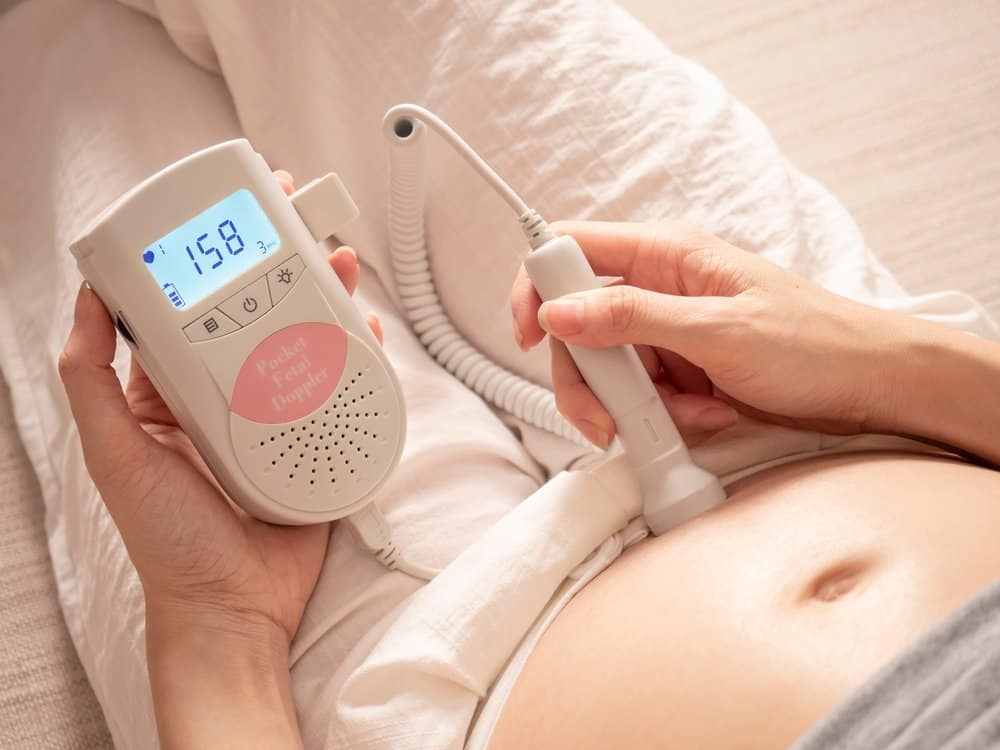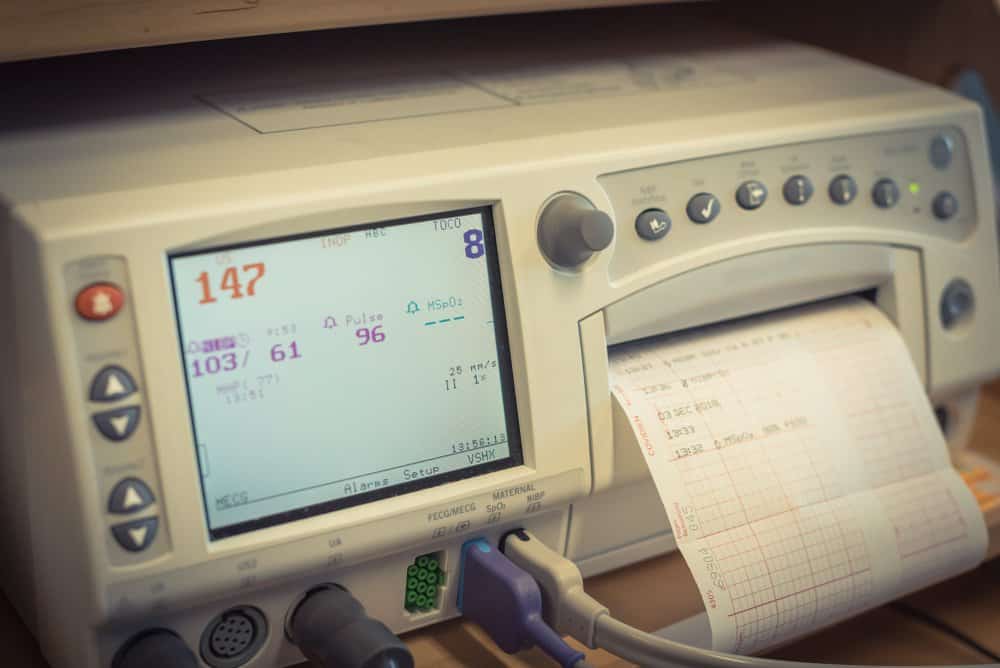For many parents-to-be, hearing their baby’s heartbeat for the first time is one of the biggest milestones along the path of parenthood. That eagerness, though, comes with lots of questions. Let’s take a look at some of the most likely ones and help curious adventurers on their journey.
When Can I Hear My Baby’s Heartbeat?
Though you can’t hear it just yet, the baby develops a basic beating heart and circulatory system as early as weeks 5 – 6. This consists of a unique blood vessel that is a tube that pulses at random intervals, as well as the loose collection of spiderweb-like vessels that will become veins and arteries.
At weeks 7 – 8, the heart has fully formed. There are four distinct chambers, each with their own openings to allow blood to pump to the rest of the blood vessels that are still forming. The baby’s heartbeat should be consistent at this point, measuring around 110 beats per minute (bpm).
Weeks 9 – 10 see the baby’s heartbeat jump to approximately 170 bpm, which is what it will be when you finally get your chance to hear it. Most physicians will recommend an ultrasound at this stage of the pregnancy, though yours may suggest one earlier, depending on medical history (e.g. previous miscarriages or difficulty getting pregnant).
How Do I Hear My Baby’s Jeartbeat?
Here, we’ll break down the most common tools for detecting your baby’s heartbeat, as well as how they work.
Ultrasound
As mentioned above, the first opportunity you will have to hear your baby’s heartbeat will be during the first-trimester ultrasound. This is performed using one of two methods:
- Transvaginal Ultrasound – a probe is inserted in the patient’s vagina and uses sound waves to produce an image of the fetus and verify the heart is beating.
- Transabdominal Ultrasound – the waves are transmitted through the external abdominal walls. A gel is spread on the patient’s belly to allow greater transmission of the waves.
Both are standard procedures and your doctor may use either one, depending on the circumstances. For instance, the transvaginal ultrasound provides a clearer picture in patients that are still in the early stages of pregnancy, as well as those who are obese. It is also preferred in the diagnosis of ectopic pregnancy, which occurs when the embryo attaches itself outside of the uterus, most likely in one of the fallopian tubes.
Fetal Doppler

A fetal Doppler is a handheld ultrasound device that uses the Doppler effect to detect your baby’s heartbeat. The big difference is that the fetal Doppler does not provide a visual image – it strictly returns simulated audio of the heartbeat, with some models calculating and displaying the heart rate.
The big appeal of these devices is that there are affordable versions that can be purchased at your local pharmacy or department store, meaning expectant parents can listen to, record, and share baby’s heartbeat with friends and family from the comfort of their home.
The US Food and Drug Administration (FDA), however, does not recommend the use of these devices by anyone other than trained medical professionals. The fetal Dopplers available for use at home are likely to be of inferior quality compared to those used by a hospital, which could lead to inaccurate results. This can cause unnecessary panic if the device does not detect a heartbeat, or a false sense of security, if it detects a heartbeat when there is none.
Apps
There are multiple mobile device applications on the market that claim to allow users to hear their baby’s heartbeat. Bellabeat is credited with releasing the first non-invasive prenatal monitor for the iPhone with the 2016 release of Shell.
Since then numerous companies have released their own apps; there are over 50 in the iPhone app store alone, including both free and paid options. Some (like Fetal Beats) require the purchase of a separate kit, which includes a fetal Doppler and gel. Most others, though, use your mobile device’s internal microphone.
The apps suffer from the same limitations as the at-home fetal Doppler, including the consequences of inaccurate readings.
Stethoscope
The earliest you will be able to hear your baby’s heartbeat without the assistance of electronic devices is approximately 20 weeks into the pregnancy. It is around this time that your doctor will be able to hear the gentle thumping using just a stethoscope.
You can purchase a stethoscope at your local pharmacy or department store and listen for yourself at home. This is less dangerous than the use of a fetal Doppler, but also runs the risk of causing panic if no heartbeat is detected.
Can I Hear My Baby’s Heartbeat Without Any Tools?
If you can’t hear your baby’s heartbeat without any external tools, don’t be alarmed; it’s nearly impossible to hear with the human ear alone. It may be possible to hear your baby’s heartbeat with only your unaided ear in the second or third trimester, if you are in a very quiet room. However, you shouldn’t count on this, and you should not your inability to hear it as a sign that there is a problem.
If you do have any concerns, be sure to reach out to your doctor.
What If I Don’t Hear My Baby’s Heartbeat?
Depending on the method being used, it is perfectly normal for no heartbeat to be detected. For instance, a transabdominal ultrasound will have a harder time finding a fetal pulse if it is early in the pregnancy or if the patient is obese.
Fetal Dopplers, both those used at home or by medical professionals, may not detect a heartbeat until 12 weeks into the pregnancy. These devices, as well as mobile device apps, are also susceptible to background noise and other forms of interference.
All methods of hearing the baby’s heartbeat can also be affected by internal biology. The location of the placenta or the tilt of the uterus can interfere with soundwaves, as well as mask the heartbeat from a stethoscope or fetal Doppler.
Why Is My Baby’s Heartbeat So Fast?

The average heart rate for an adult human can range from 60 to 100 bpm; a fetus can pass 170 bpm during the first trimester. The thing to remember is the human heart is a muscle, which means it needs to be used to increase its strength. Since a fetal heart lacks strength in the early stages of pregnancy, it has to beat more often to deliver blood to the rest of the developing circulatory system.
Why Is My Baby’s Heart Rate Changing?
As the heart develops and gets stronger, the baby’s heartbeat will decrease. It should settle around 120 bpm towards the end of the pregnancy. There is no need for concern unless the heartbeat drops below 110 bpm or jumps to over 160 bpm.
What Can I Do To Ensure the Health of My Baby’s Heartbeat?
As an expectant parent, you will be interested in maintaining and encouraging the health of your baby’s heart. There are some simple things you can do to promote this:
Quit Smoking
According to the Center for Disease Control (CDC), smoking can lead to an increase in the likelihood of your baby developing heart disease, as well as other health complications like being born prematurely and an increased risk of Sudden Infant Death Syndrome (SIDS).
Quit Drinking
As with smoking, alcohol consumption during pregnancy can lead to myriad health issues, including low body weight, delays in behavioral and intellectual development, and heart disorders.
Increase Folic Acid Intake
Folic acid is a form of vitamin B that can be found naturally in leafy greens, legumes, and some fruits. It is often present in most prenatal supplements as it has been shown to decrease the likelihood of certain birth defects and prevent congenital birth defects. Consult your physician to determine if you need to increase your folic acid intake.
Get Ready to Hear Your Baby’s Heartbeat
As excited as you may be to hear your baby’s heartbeat, it’s best to listen to your doctor’s guidance on the subject. At-home devices and apps can be convenient, but run the risk of causing undue stress with their inaccuracy.
Keep yourself healthy and your baby will have a better chance of developing normally, allowing you to experience future parental milestones that all start with hearing baby’s heartbeat.
